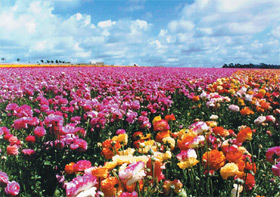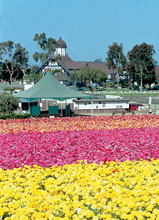|
Featured
Article
Colorful
History of the Flower Fields
The
Flower Fields® history is almost as colorful and
enduring as the vibrant blooms. It is a story steeped
in pioneer spirit, a persistence for perfection and,
above all, a lot of long, hard, dirty work. It is also
the story of Ed Frazee, thought of as the father of
The Flower Fields®.
Frazee, now 82, remembers seeing ranunculus blooms for
the first time in 1922. His father, Frank, was growing
English peas in a Carlsbad field near Tamarack Avenue
for horticulturist Luther Gage. When Gage was gone,
Frank Frazee would water the flowers that grew in the
garden, and among them were some beds of ranunculus.
A few years later, a fire destroyed the Frazee ranch
on the inland shore of the Agua Hedionda Lagoon, and
the family moved to Oceanside, where Frank began growing
freesia bulbs to make ends meet. Freesias were in high
demand, and Frank grew them on land he leased from the
city. In 1932, he added ranunculus and introduced his
son, Edwin, to the art of seeding. By age 16, Edwin
quit high school to work full time at his father’s
burgeoning flower operation.
Over the next several years, Edwin Frazee settled into
the farming life, expanding his fields on what eventually
would become Camp Pendleton. He became adept at improving
his ranunculus crop, and by the 1950s he eluded his
competitors by breeding a superior ranunculus bulb with
an unprecedented infusion of petals, known as a “double.”
This made him the only commercial ranunculus grower
in the U.S. Frazee concluded that ranunculus thrived
best in a mild climate and sandy, well-drained soil.
He decided to expand his crop to a coastal slope in
Carlsbad overlooking the ocean and Highway 101. This
field of vibrant, seasonal color attracted the growing
number of motorists traveling between Los Angeles and
San Diego, and quickly became a tourist attraction,
even gaining the attention of photographers for National
Geographic. Frazee and his workers soon found much of
their time taken up by visitors helping themselves to
free bouquets of gladiolus and ranunculus.
By 1975, Edwin Frazee retired, leaving the business
to his sons, John and Jim. Soon after, the Flower Fields
were moved a few miles north, off Palomar Airport Road
just east of the Interstate 5 freeway. The land was
owned by Carltas Co., the land division of the Paul
Ecke Family, and for years was used to grow the Eckes’
world-famous poinsettias. The location offered a magnificent
sea of color to motorists and, for awhile, seemed to
be the perfect arrangement between the two renowned
floral dynasties.
However,
without Edwin Frazee’s enthusiasm, son Jim eventually
determined the fields were not cost-effective and, in
1993, asked Paul Ecke Jr. to terminate his lease.For
the first time, Carlsbad’s famed flower fields
faced extinction.
The news was disturbing to Mr. Ecke because the fields
represented a continuing part of the floral business
that the Ecke family had pursued for years, and also
figured prominently in Carltas’ plans to develop
the surrounding area (which became known as Carlsbad
Ranch). The flowering fields were to be a landmark gateway
to adjacent projects that included the Legoland California
theme park along with championship golf, a resort hotel
and the Gemological Institute of America.
In August 1993, Carltas secured a loan from the California
Coastal Conservancy to provide the capital necessary
to keep the fields running for at least two more years.
A venture to take over 50 acres of ranunculus was formed
by Carltas and Mellano & Co., a prominent grower
in the San Luis Rey Valley. Edwin Frazee was personally
persuaded by Ecke Jr. to come out of retirement and
provide knowledge about growing the crop, which now
includes spreads of gladioli, watsonia, sparaxis (Wandflower),
oxalis (Blooming Shamrock), babiana and tritonia. Hence,
The Flower Fields® at Carlsbad Ranch was born.
Today, the operation represents the perfect synthesis
of a robust working ranch and regional tourist attraction.
Ample parking, a garden center, special events and tours
provide easy access, historical information and floral
products to over 150,000 visitors a year.
FlowerFields in Carlsbad, Californa is the largest independent
garden center in the Western U.S.
For
eight weeks each spring, on coastal farmland in Carlsbad,
California, 50-plus acres of Giant Tecolote® Ranunculus
flowers bloom and transform the landscape into a solid
expanse of vibrant, banded color. For those living in
the region, color in The Flower Fields® signifies
the beginning of spring—a reliable and welcome
rite of renewal and regeneration.
The Flower Fields®, in partnership with Armstrong
Garden Center, is the largest independent garden center
company in the Western U. S., and offers a unique experience
for those who delight in these beautiful blooms.
Opened last year, the new, 33,000- square-foot, state-of-the-art
facility offers various retail activities, including
seasonal displays and special gardening events. Garden
accessories, gifts, clothing, ranunculus blooms, garden
art, and a full line of The Flower Fields® garden
plants are for sale.
An All-America Rose Selection test garden and All-American
Walk of Fame, featuring all 173 past AARS winners since
1940, will debut this year.
Other featured attactions this year are The Flower Fields®
Theme Gardens. Five new gardens—Sun, Shade, Cottage,
Cutting and Fragrance—will feature The Flower Fields®
line of flowering plants. They will be as instructive
as they are beautiful.
For additional information and directions, call (760)
431-0352.
Frequently
Asked Questions & Answers - Back in school, our
teachers taught us to ask questions and reminded us
that the most foolish questions were the ones not asked.
The
Flower Fields® in Carlsbad is delighted by spectators’
genuine interest in their operation! Over the years,
they have compiled a list of “most asked questions.”
Curiosity about the flowers, the bulbs, the ranch and
the spectacular view has aided their effort to publish
this information. Here are some of the most-asked questions.
What
kind of flower is grown there?
It is called the Tecolote® Giant Ranunculus, which
is one of the finest strains of ranunculus plants in
the world. The ranunculus flower is native to Asia Minor
and is a member of the buttercup family. This unique
blossom is also known as a Persian Buttercup or Ranunculus
Asiatic.
How large are the fields?
Over 50 acres are devoted to raising the ranunculus
bulb crop. Approximately 5 acres are used for gladioli,
while the watsonia and other flowers utilize about five
acres.
(story
featured in South
Coast Magazine )
© Copyright 2004 South Coast Magazine.
No unauthorized duplication without written consent.
|



![]()


